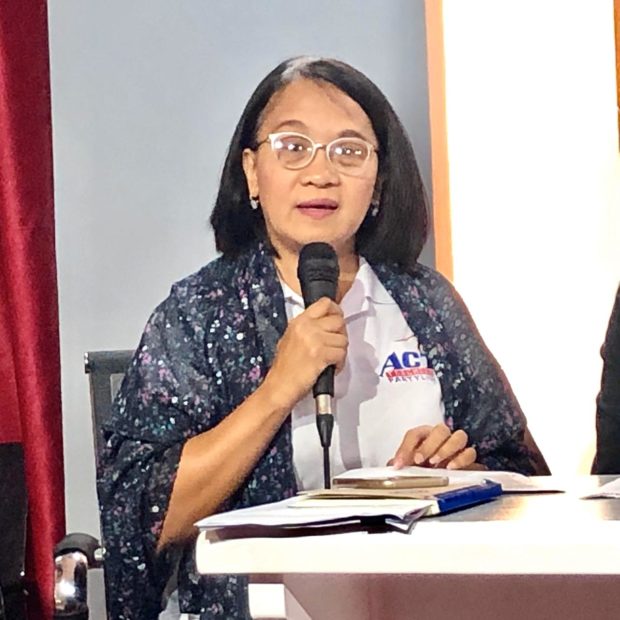
FILE PHOTO: ACT Rep. France Castro during the weekly press briefing at the House of Representatives in this file photo taken on November 21, 2019. INQUIRER.net file photo / Noy Morcoso
MANILA, Philippines — The existing K-12 education system needs overhauling after the Commission on Human Rights (CHR) revelation that students who graduated amid the pandemic lacked soft skills, Alliance of Concerned Teachers Rep. France Castro said.
In a statement on Wednesday, Castro said that the COVID-19 pandemic only worsened existing educational system problems, which she believes were compounded by the K-to-12 system.
The K-12, implemented in 2013 under former president Benigno Aquino III, ushered in reforms to the system by adding two more years to the secondary high school — Grades 11 and 12 — considered Senior High School. The goal of the additional years was to equip students with the skills needed to prepare them for jobs without needing a college education.
However, as stated in the CHR report, many education and career experts believe the system has not equipped students with the soft skills, personal traits, and emotional intelligence needed in the workplace.
“Pinalala lang ng Covid ang matagal ng problema ng edukasyon sa Pilipinas lalo pa ng ipinatupad ang K-12 na nagsaksak ng sangkatutak na mga asignatura sa kurikulum pero tinanggal naman ang mga dapat na nalalaman ng mga bata tulad ng Araling Panlipunan at Filipino na magtuturo sana sa kanila ng kritikal na pag-iisip at kung paano ang pagharap sa kapwa,” Castro said.
(The COVID-19 pandemic worsened the long-standing problem of education in the Philippines, especially when the K-to-12 system that placed too many subjects in the curriculum was implemented, but at the same time removed subjects needed by children like Social Studies, and Filipino Language, which could have taught them critical thinking and how to approach other people.)
“Marapat talaga na ma-overhaul na ang K-12 ng isang sistema ng pagtuturo na mas angkop para sa mga batang Pilipino at di naman din lalaspag sa kanila at sa mga guro at totoong magagamit nila ang kanilang mga natututunan,” she added.
(It is only fitting to overhaul the K-12 to a system that is fit for Filipino students and one that would not tire students and teachers, and one where their skills would be put to use.)
The CHR on Tuesday released a set of findings seeking to highlight the challenges faced by new graduates who finished schooling amid the COVID-19 pandemic, which forced students to study from home or do distance learning for over two years.
According to the report, the government’s K-12 program tries to give senior high school students the much-needed competencies. However, “not much attention is given to developing their life and soft skills, which, as the employer participants attest, are equally important in the workplace.”
READ: Job hunt tough for graduates of ‘pandemic generation’
Aside from that, the CHR report also noted that many graduates lack “job-readiness” — attributed to many factors like the unconventional learning systems adopted during the height of the pandemic, but also to the inadequacy of existing educational programs.
Castro said the pandemic “aggravated” the students’ lack of soft skills.
“Now when the pandemic struck this flaw was further aggravated because there are no more face-to-face classes many students lacked “soft skills” — or those related to empathy, creativity, resilience, and communication — as well as practical job skills,” Castro, a teacher by profession, noted.
Stakeholders have frequently blamed the K-12 system for a supposed decline in graduate skills.
Due to alleged problems, there have been calls for a review of the system, which added two years to the student’s schooling while simultaneously compounding the necessary skills.
In June 2022, Castro urged Education Secretary and Vice President Sara Duterte to review the K-12 program due to its failure to deliver on promises.
READ: Officials back review of K-12 program
READ: CHEd chief ‘interested’ in K-12 program review
Just this January, Duterte vowed that DepEd is reviewing the program, vowing to revise the congested system.
READ: DepEd to revise ‘congested’ K-12 curriculum